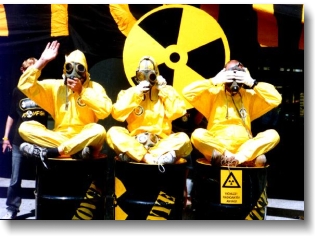

THE PETITION OF THE ANTINUCLEAR WORKING GROUP OF HUNGARY
To: Horst KŲhler (President), Hubert Warsmann (Hungarian director), KŠroly A. Sůos(Alternate director)
Budapest, 11. August 1998
Dear Sir,
In our letter dated in the beginning of July, we turned to the EBRDís then president with the following:
"this time we turn to you with the matter of the ongoing Ukrainian nuclear project. Last week the EBRD assented to the revision plans regarding the half terminated nuclear power plant at Khmelnyitsky and Rovno (K2/R4), which means that the termination of the investments can be started now. This includes the 120-day public participation process, which is about to start soon. Hungarian citizens, like those who live in the possible affected areas, have the right to know about and comment on the investment details. The EBRD`s environmental governing principles apply the Espoo Convention, that came to life for the environmental impacts that may cross country borderlines. According to this, the Hungarian government rightly asks the Ukrainian government the following:
- the necessary documentation - project description, the safety report, the least cost study and the Environmental Impact Assessment - should be made available and the cost of the project should be translated into Hungarian
- public hearings should be held in Hungary in co-operation with those concerned, where those interested can receive answers to their questions and can give voice to their opinion on the matter of investments.
There has already been a case of a public hearing in Hungary, namely the Mochovce NPP, also an EBRD project. Drawing a lesson from the case mentioned just now, we would like if the government and the concerned authorities and institutions took into account the experience we have gained and could enable a quicker administrative agency procedure this time."
To this day, the Bank has not reponded to our letter; we therfore had to go again in person to give some weight to our concerns regarding the K2/R4 plan, which we would like to explain during the public hearings in the framework of the Bankís public participation procedure. In our opinion the loan would not fulfil the requirements laid out by Jacques de Larosier at the 1996 Annual Meeting of the Bank.
"If we were to engage the ordinary resources of the bank in such (nuclear) projects, in addition to requiring the closure of dangerous reactors we would basically have to respect four conditions.
∑ One, the safety of any nuclear plant we would be working on would have to be at the highest existing standard;
∑ Second, the project in question would have to be sound in financial terms;
∑ Third, and there is no order of priority in this listing, the project in question would have to be clearly the least-costly one;
∑ Fourth, the entity which would have to operate this hypothetical nuclear plant, in whose financing we would have participated, would have to be strong enough in terms of quality, professionalism, ability to carry out the implementation of its project for a long period, to give us satisfaction."
The completion of the two soviet design reactors and their upgrade to western safety standards will not be economically feasible. Further more there are many external environmental concerns against the projects. The K2/R4 project were deemed uneconomic by the EBRD-commissioned Independent Panel of experts in February 1997. The panel was hired to examine whether the completion of the two reactors which were stopped because of financial reasons was the least cost option for Ukraine and to see if it was financially viable. Despite the Panelís explicit recommendation not to proceed with the project, new economic studies have been commissioned. Given both the Panelís clear mandate and unambiguous conclusion, the commissioning of new reports raises doubts regarding the Bankís desire to procure a fair and impartial opinion in this matter.
Drawing the conclusion from the above, the Anti-nuclear Working Group demands the EBRD to halt any further activity regarding the K2/R4 project preparation and instead support the sustainable energy future of Ukraine, for instance renewable and efficiency projects, as well as in other countries of the region.
Energy Club and E-mission Environmental and Nature Protection Association
